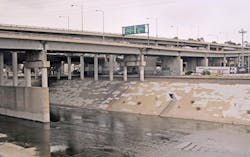Los Angeles area plastics manufacturers remedy Clean Water Act violations
LOS ANGELES, CA, MAY 21, 2018 -- The U.S. Environmental Protection Agency has recently reached settlements with two Southern California plastics manufacturers over federal Clean Water Act violations. Under the terms of the settlements, both companies will take steps to prevent plastic materials they manage from washing into local waterways. Combined, the companies will pay more than $35,000 in penalties.
During inspections at the two facilities in 2016, EPA found inadequate containment measures that allowed plastic materials, including pellets known as "nurdles," to enter local waterways. Nurdles are plastic beads about 1/5-inch in diameter that are widely used in manufacturing. These plastic materials contribute to harmful debris in the nation's inland and coastal waters and pose dangers to fish, birds and other wildlife.
RELATED: EPA: Southern California plastic manufacturers must protect L.A. River from pollution
Modern Concepts Inc., located in Compton, Calif., and Double R. Trading Inc., located in City of Industry, failed to install required controls that prevent plastic and other materials from washing into storm drains and discharging into the Los Angeles River and Port of Los Angeles, respectively. Both companies have corrected the violations and returned to compliance.
"We urge manufacturers to take the steps needed to keep plastic materials out of our waterways, where they harm marine organisms and birds," said Alexis Strauss, EPA's Acting Regional Administrator for the Pacific Southwest. "This is but one action among many we can take to minimize the scourge of marine debris."
EPA coordinated the inspections with the Regional Water Quality Control Board in support of their efforts to reduce plastic pollution in the Los Angeles area.
"Trash in our waterways, including plastics, poses a significant threat to public health and wildlife," said Deborah Smith, Executive Officer of the Los Angeles Regional Water Quality Control Board. "Addressing this water quality problem has been a top priority for the Los Angeles Water Board since 2001 to reduce the amount of trash being discharged to the Los Angeles River. This trash-reducing regulatory program was the first of its kind and has prevented tons of trash from entering the river. The Board will continue to work in partnership with EPA to ensure ongoing protection of the Los Angeles River and other regional waterways."
Modern Concepts stores pre-production nurdles at its facility as part of its plastic products manufacturing process. EPA's inspectors observed spilled plastic pellets on paved surfaces throughout the facility, which is located near Compton Creek, a tributary of the Los Angeles River. EPA also found the facility lacked pollution prevention equipment and used inadequate cardboard storage boxes, which exposed the pellets to rain and wind.
Under the agreement, Modern Concepts Inc. will pay a $12,000 penalty for the violations.
Double R Trading Inc. operates a recycling plant that grinds plastic material into flakes that are ultimately exported to China. EPA inspectors discovered that the facility, when it was operating in Compton before moving to City of Industry, was discharging industrial stormwater into Dominguez Channel without a required permit. EPA inspectors observed large amounts of exposed plastic materials and fragments spilled on paved surfaces throughout the facility.
The inspection found that the facility did not have necessary containment systems to trap plastic material and prevent releases to a waterway that flows into the Port of Los Angeles. Additional violations included improper outdoor storage of oils and industrial.
Double R Trading Inc. will pay a $23,326 penalty.
Nurdles or small flakes of plastic that wash into storm drains and out to open water can be eaten by fish, birds and other wildlife. Ingested plastic can displace food in an animal's stomach and may lead to starvation. In the marine environment, plastic debris can absorb persistent toxic chemicals that migrate up the food chain and pose risks to human health.
Under the Clean Water Act, plastic manufacturers must obtain a stormwater permit from the state to discharge industrial stormwater to surface waters. The permit requires the installation of controls and use of best management practices to prevent or minimize the discharges of pollutants in runoff from their operations. Such discharges may contain pollutants such as plastic resin pellets, flakes or powders.
For more information on stormwater permits under the Clean Water Act, please visit: www.epa.gov/npdes/npdes-stormwater-program
